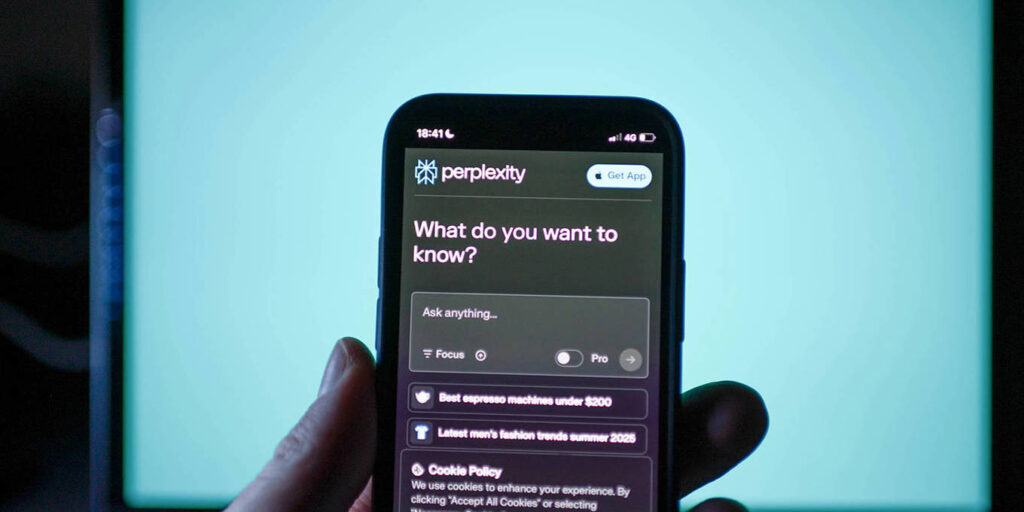SAN FRANCISCO – There is growing public alarm about how generative AI might obliterate established (“legacy”) industries and professions, ranging from lawyers to Uber drivers to accountants. But what is often overlooked is that the first major victim of AI disruption will undoubtedly be the technology sector itself. AI is already starting to cannibalize established giants, and also to reshape the profession of software engineering, with major implications for research, antitrust policy, and safety regulation.
America’s Weak Strongman

Win McNamee/Getty Images
The Bonfire of the Banking Regulators?

Bettmann/Getty Images
The End of German Complacency

Sean Gallup/Getty Images
Since the invention of modern computers during World War II, technological progress has enabled us to make computers ever more convenient for normal humans. But all those systems have continued to rely on rigid, highly structured ways of programming and using computers. This is true even of many consumer applications: Think of how we search for information, fill out forms, navigate screens, create spreadsheets, and specify document formatting.
But with the advent of AI, that is starting to change.
The most obvious victim of AI disruption within the technology sector is Google, whose revenues derive primarily from ads inserted in search results. Using traditional Google Search has become a cumbersome process of sorting through too many links and ads. But with OpenAI’s ChatGPT, Anthropic’s Claude, or Perplexity, you simply request the information you want and get it. They are still imperfect, but already vastly superior to the Google hunt-and-peck model. Their usage is growing about 10% per month, and this year ChatGPT alone will probably exceed $10 billion in revenue. Google has belatedly released AI Mode, but it’s hard to see how the company can respond effectively without destroying itself. Google’s management is clearly aware of this, and thoroughly terrified – as they should be.
Something broadly similar appears to be true of a high fraction of the technology sector. The current industry’s giants – the likes of Microsoft, Apple, Salesforce, SAP, Nvidia, Amazon, Intel, and Dell – were themselves built on technologies that disrupted earlier incumbents, particularly IBM and its mainframes. But those once-revolutionary technologies are all several decades old now. AI may well supersede them, and it is already opening space for new disruptors.
Consider so-called productivity applications such as word processors and spreadsheets. Microsoft and others are adding AI “copilots” to their products. But all of those products are burdened by history. They cannot change much, because they must retain compatibility with all the documents and applications already built with them. The same is true of many other traditional applications that handle documents, email, calendars, data retrieval, and presentation graphics.

PS Events: London Climate Action Week 2025
Don’t miss our next event, taking place at London Climate Action Week. Register now and watch live on June 23 as our distinguished panelists discuss how business can fill the global climate-leadership gap.
Disrupting the Disruptors
As an experiment, before writing this article, I asked Perplexity to write it for me, based on a paragraph of instructions. It did a pretty decent job, at least as a first draft, and I could have refined it into something usable. I didn’t; but, regardless, that’s child’s play. Soon, even that process will become easier: with verbal instructions, there will be no need to type anything, and we will be able to do much more than Word or its conventional brethren allow.
And that’s just the start. Suppose you wanted to find every AI startup CEO in the San Francisco Bay Area whose company’s revenues were under $10 million, write each of them a customized email asking for a job, attach your CV to each message, and automatically track the replies. Microsoft will doubtless try adding that capability to MS Office. But it will be messy and complicated. Wouldn’t you be better off using something designed from the ground up with AI in mind, a product that just did all that for you when you asked it to? Yes, you would, and several AI startups – such as Clay and Paradigm – are already challenging Microsoft in precisely this way. Similarly, FuseAI is challenging Salesforce, several other startups are challenging LinkedIn, and so on.
Now consider our personal devices. Current mobile phones – all of them, from iPhones to Samsung Galaxies to Google Pixels to those from Huawei and Xiaomi – use microprocessors, operating systems, and user interfaces whose architectures are decades old, none of them designed for AI. But several startups (such as Etched) are working on new AI processors. Within five years, we will surely be able to run good AI models on a phone, a development which could spawn radically new operating systems and applications.
The shift is already underway. On May 21, OpenAI announced that it was buying Jony Ive’s startup io for $6.5 billion in order to develop new AI-first mobile devices, with the explicit goal of displacing Apple. I have some doubts about this particular venture, but the disruption will surely occur. Similarly, there will undoubtedly be AI challengers to both Mac and “Wintel” desktop and laptop computers.
Online shopping – particularly on Amazon – is another area poised for profound change. Amazon’s market power derives from two sources – its unmatched logistics systems (warehouses, fulfillment centers, delivery trucks) and software that helps you search for, evaluate, and purchase nearly anything. But Amazon’s interface is cumbersome, in ways rather similar to Google Search. What if you could just tell your AI to search the internet, find the nearest store carrying X, or the world’s best product for doing Y, and then have it delivered? In such a world, Amazon’s advantages would erode quickly. We are not there yet, but many smart people are working hard to make it a reality. OpenAI has already introduced a product, and Perplexity has made a deal with Shopify to enable Perplexity searches to find and display products in online stores built with Shopify.
My sense is that this new generation of disruption, with AI rendering much of the current technology sector obsolete, could occur faster and more forcefully than earlier ones, including the transitions from mainframes to PCs, from landlines to mobile devices, or from cable TV to streaming services. AI technology is improving stunningly fast – and nowhere faster than in the automation of software development itself. The rate at which AI is disrupting software engineering is nearly surreal.
Thanks to AI tools such as Cursor, Windsurf, and Claude Opus 4, the pace of software development in leading edge AI companies has increased sharply; I have seen and heard estimates ranging from 25% improvement to a doubling of software productivity in the last year alone. In my own AI investing, I now routinely encounter startups with only a few employees that developed their entire product within a few months – and sometimes within a few weeks. One subject of amused but serious conversation in the industry is when we will see the first one-person startup unicorn. We may not have to wait long.
Many people involved with AI believe that software engineers may disappear completely. I don’t think so, but the profession will change dramatically, and many older software engineers may indeed find their skills rendered obsolete. Even software engineers at Google, a very elite crowd, are worried about losing their jobs, particularly as AI disruption of search starts to affect Google’s revenues.
The Half-Life of Monopolies
For many observers, the humbling of the industry’s giants at the hands of a radically accelerated AI startup sector couldn’t arrive too soon. After all, the incumbents’ looming vulnerability comes after many years of astounding profits derived from monopolies, cozy oligopolies, and “walled gardens.” Several incumbents have clearly started squeezing their semi-captive users, degrading product quality to increase profits, a phenomenon that the writer Cory Doctorow has colorfully termed “enshittification.” (Google and Apple are often cited.) Even as the incumbents face potentially mortal threats, they also face antitrust actions and growing complaints from suppliers, application developers, and consumers.
Both phenomena – the threat of disruption, and longstanding, extreme market power – are very real. As a general matter, this is not new. The history of the technology sector is one of successive monopolies eventually eliminated by technological revolutions that produce new monopolies. Regulatory or antitrust actions have sometimes helped unleash innovation – the Federal Communications Commission’s opening of long-distance telecommunications to competition in the 1970s, the breakup of AT&T in the 1980s, the Microsoft antitrust case in the 1990s, and prevention of several attempted acquisitions.
But antitrust and regulatory systems, never swift and sometimes foolish, have been progressively crippled over the last several decades by a combination of worsening bureaucracy, obsolescence, and growing corruption. In both Europe and the United States, it takes many years, and sometimes decades, to resolve antitrust cases; defendants such as Microsoft, Google, and Apple hire the most prominent specialists in antitrust economics and law, in order to oppose and delay everything. Corporate antitrust defendants often outspend the government by a hundred to one.
The incumbents also benefit from the fact that antitrust laws and legal precedents, some of them over a century old, are woefully inappropriate to the realities of modern information technology. For example, Google avoided any antitrust scrutiny of its acquisition of Character.AI because it didn’t technically acquire Character.AI at all. It simply acquired everything important about Character.AI – its top talent and its technology – by paying its investors and employees $3 billion. Microsoft did the same thing with another major AI startup, Inflection AI, paying $650 million, and Amazon did it, too, not acquiring Adept for at least $439 million.
Some argue that, given the ease with which regulatory systems can apparently be subverted, and given that technological revolutions eventually dethrone incumbents for us anyway, we shouldn’t even bother with antitrust or regulatory policy at all. Perhaps it would be more efficient, and less subject to corrupt influence, if we simply did everything possible to support startups, accelerate research, and foster the creation of new challengers.
Alas, I fear that this wouldn’t be enough. There are times when breaking up a company, or preventing it from acquiring all of its potential challengers, really is important. And there are serious risks associated with supercharging a gigantic AI industry without proper regulation. With AI, powerful new technologies are being controlled by founders who, in some cases, are literally still children, and certainly sometimes behave that way. So, while antitrust law and procedures badly need modernization and reform, I would not abolish them.
This raises the question of what could reasonably be done to support innovation and competition in the absence of serious (and currently very unlikely) antitrust reform. Europe’s startup ecosystem is in tatters, and AI disruption places Europe’s economic health and military security at grave risk. In the US, conversely, the startup system is strong, but academic and government research are both endangered. One extremely valuable policy would be a major increase in funding for US computer science education, academic research, and federal R&D, guaranteeing a continuing flow of new ideas and founders not controlled by incumbents.
Another possibility would be to tighten regulatory oversight of acquisitions, including “non-acquisition acquisitions.” Most technology insiders oppose such restrictions, arguing that acquisitions are procompetitive and even necessary. The argument here is that, because IPOs have become far less common, acquisitions provide essential “exit” opportunities – financial returns to startup founders and investors.
I am ambivalent about this, and I certainly don’t like the idea of giving up on antitrust policy. I will say, however, that right now Silicon Valley is doing a much better job of clipping Google’s wings than either the Department of Justice or the EU ever have.
Charles Ferguson is an angel investor, a limited partner in six AI venture capital funds, and a nonexclusive partner in Davidovs Venture Collective. His direct investment positions include three technology incumbents (Apple, Microsoft, and Nvidia) and many AI startups including Perplexity, Etched, CopilotKit, Paradigm, Browser Use, FuseAI, and Pally.

